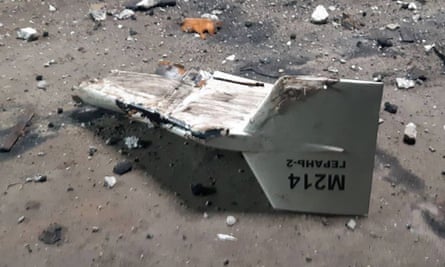Russia has threatened that it will reassess cooperation with the United Nations secretary general, António Guterres, if he sends United Nations experts to Ukraine to inspect drones that western powers say were made in Iran and used by Moscow in violation of a UN resolution.
Speaking after a closed-door UN security council meeting on Moscow’s use of drones, Russia’s deputy UN ambassador, Dmitry Polyanskiy, called on Guterres and his staff to “abstain from engaging in any illegitimate investigation”. He also threatened Russia would withdraw from the grain deal that has allowed Ukrainian grain to be transported out of Black Sea ports.
Polyanskiy insisted the precision weapons had been made in Russia and condemned “baseless accusations and conspiracy theories”.
But Ben Wallace, the UK defence secretary, said Moscow’s reliance on Iranian drones showed the strategic degradation of Russian weaponry, and urged the Iranian government to recognise it should not want to be associated with Russia’s indiscriminate killing of women and children.
The UK foreign secretary, James Cleverly, is expected to join the EU in announcing the imposition of fresh sanctions on three Iranian military commanders, including Maj Gen Mohammad Hossein Bagheri, the chief of staff of Iran’s armed forces.
Polyanskiy urged Guterres and his staff to “abstain from engaging in any illegitimate investigation. Otherwise we will have to reassess our collaboration with them, which is hardly in anyone’s interests. We do not want it, but there will be no other choice.”
Insisting the unarmed aerial vehicles (UAVs) were made in Russia, he pointed to the label of “Geran” – which means geranium in Russian – on their outer shells. “I would recommend that you do not underestimate [the] technological capabilities of the Russian drone industry. I can tell you, we know what to do and now how to do it,” he said.
Polyanskiy said it was absurd the US was accusing Iran of breaching the nuclear deal since it had been the US that had walked out of it in 2018. He said the UN secretariat had no mandate in relation to the UN resolutions linked to the nuclear deal, adding that the UN secretary general was a creature of western capitals.
Asked why he opposed an investigation committee examining the drone fragments, if he was so clear they were of Russian origin, he replied the UN had no mandate to mount an investigation.

The US, Britain and EU say they have incontrovertible evidence that Iran supplied Russia with Shahed-136s, the low-cost drones that have been responsible for inflicting massive damage to Ukraine’s electricity infrastructure.
Washington says any arms transfer is in contravention of the UN security council resolution 2231, which implements the 2015 nuclear deal known as the Joint Comprehensive Plan of Action (JCPOA), a now-moribund deal to curb Iran’s nuclear activities and prevent the country from developing a nuclear weapon. Iran has been free to export arms under the deal since 2020.
Ukraine and its western allies argue that the resolution still includes restrictions on missiles and related technologies until October 2023, and can encompass the export and purchase of advanced military systems such as drones.
On Wednesday, Iran’s UN envoy, Amir Saeid Iravani, rejected the “unfounded and unsubstantiated claims” on the drone transfers and said that Tehran, which has abstained in votes on the war, wanted a “peaceful resolution” of the conflict, which began when Russia sent its troops into Ukraine on 24 February.
The French UN ambassador, Nicolas de Rivière, said Guterres has a “clear mandate twice a year to report on all these things and to make technical assessments, so I think the UN secretariat will have to go [to Ukraine] and will go”.
Guterres reports twice a year to the security council – traditionally in June and December – on the implementation of the 2015 resolution. Any assessment of the drones in Ukraine would probably be included in that report.